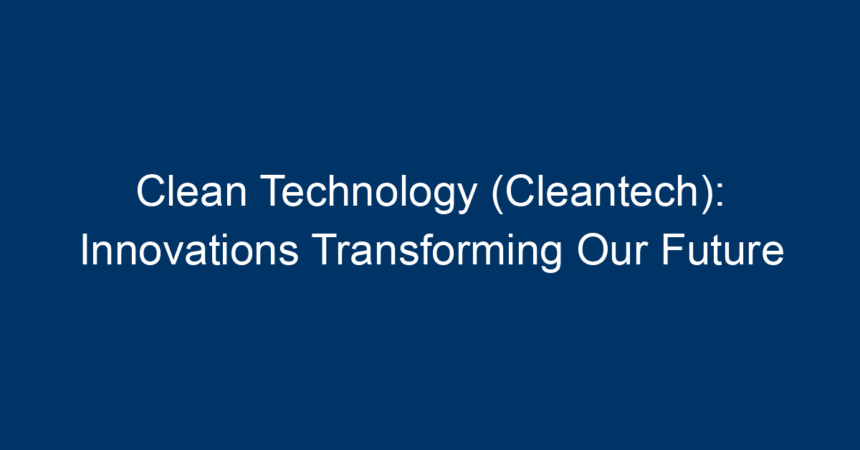In a world grappling with environmental challenges like climate change, pollution, and energy scarcity, the need for sustainable solutions has never been more urgent. Enter clean technology (cleantech)—a transformative sector dedicated to developing innovative solutions that promote environmental sustainability while fueling economic growth. Cleantech encompasses a broad array of technologies designed to improve efficiency in the use of resources, reduce waste, and minimize carbon footprints. This article delves into the realm of clean technology, exploring its significance, key innovations, applications, and future prospects.
Understanding Clean Technology (Cleantech)
Clean technology (cleantech) refers to products, services, and processes that utilize sustainable resources while minimizing negative environmental impacts. From renewable energy solutions to waste management systems, cleantech spans various sectors, including energy, water, agriculture, and transportation.
The Importance of Clean Technology
The impact of clean technology cannot be overstated. As the effects of climate change become increasingly evident, cleantech serves as a beacon of hope:
-
Mitigating Climate Change: Cleantech innovations aim to reduce greenhouse gas emissions, addressing the root causes of climate change.
-
Enhancing Energy Efficiency: By optimizing energy use, cleantech contributes to lower energy bills and reduced reliance on fossil fuels.
- Promoting Sustainable Economic Growth: Cleantech is not just good for the planet; it also creates jobs and stimulates local economies.
Breakthrough Innovations in Cleantech
1. Renewable Energy Sources
Solar Power: Solar energy has witnessed phenomenal growth, with advancements in photovoltaic technology making it more efficient and affordable. Innovations such as solar skins and bifacial panels are increasing energy capture.
Wind Energy: Offshore and onshore wind farms are becoming increasingly efficient. Innovations in turbine design and installation techniques are enhancing the capacity and reliability of wind power.
Hydropower: Modern hydropower technologies focus on minimizing environmental impact while maximizing energy production. Smaller, more efficient turbines are being deployed in rivers and streams.
2. Energy Storage
Energy storage solutions are crucial for balancing supply and demand, especially as the reliance on intermittent renewable sources grows. Innovations in battery technology, such as lithium-sulfur and solid-state batteries, are paving the way for more efficient, longer-lasting storage solutions.
3. Sustainable Agriculture
Clean technology is revolutionizing agriculture by promoting sustainable practices. Innovations like precision farming use drones and IoT sensors to optimize resource use, reducing water waste and increasing crop yields. Vertical farming and aquaponics are further examples of urban agriculture that minimize land use and environmental impact.
4. Water Management
With freshwater scarcity becoming a global challenge, cleantech innovations in water management are essential. Desalination technologies, advanced filtration systems, and smart irrigation are providing solutions that sustainably harness and manage this precious resource.
5. Green Building Technologies
The construction industry is embracing clean technology with innovations aimed at energy efficiency, such as green insulation materials, energy-efficient HVAC systems, and smart building technologies that monitor energy consumption.
Applications of Clean Technology (Cleantech)
Smart Grids
Smart grids integrate digital technology into electricity distribution, allowing for real-time monitoring and management of energy use. This innovation enhances energy efficiency and reliability while enabling the integration of renewable energy sources.
Electric Vehicles (EVs)
The automotive industry is undergoing a significant transformation with the rise of electric vehicles. Innovations in battery technology and charging infrastructure are making EVs more accessible and practical, contributing to reduced emissions and improved air quality.
Waste Management Solutions
Innovations in waste management technologies, including waste-to-energy systems and advanced recycling methods, are diverting materials from landfills and converting waste into valuable resources.
Challenges Facing Clean Technology
While the benefits of clean technology are substantial, several challenges must be addressed:
-
High Initial Costs: Many cleantech solutions require significant upfront investment, which can be a barrier for widespread adoption.
-
Technological Development: The rapid pace of innovation requires ongoing research and development to keep up with evolving challenges.
- Regulatory Hurdles: Navigating complex regulations can hinder the advancement and implementation of clean technologies.
Future Prospects for Clean Technology
The future of clean technology (cleantech) is bright and brimming with potential. As governments and businesses increasingly recognize the importance of sustainability, investments in cleantech are set to soar. Emerging trends to watch include:
-
Decentralized Energy Systems: With advancements in microgrid technology, communities can generate and manage their own energy, enhancing resilience and reducing reliance on centralized systems.
-
Circular Economy Initiatives: The shift toward a circular economy focuses on reducing waste through recycling and reusing materials, aligning perfectly with cleantech principles.
- Artificial Intelligence (AI) in Cleantech: AI’s role in optimizing energy consumption and streamlining resource management is set to grow, making cleantech solutions even smarter and more efficient.
Actionable Insights for Individuals and Businesses
-
Embrace Sustainable Practices: Individuals can contribute by adopting energy-efficient appliances, reducing waste, and utilizing public transport or electric vehicles.
-
Invest in Renewable Energy: Homeowners and businesses should consider investing in solar panels or wind turbines to harness renewable energy.
-
Support Cleantech Startups: Investing in or supporting cleantech startups can drive innovation and accelerate the adoption of sustainable technologies.
-
Advocate for Policy Change: Individuals and organizations can influence policymakers to support incentives for clean technology adoption and investment.
- Educate and Involve: Engage in community initiatives focused on sustainability and educate others about the importance and benefits of clean technology.
Conclusion
Clean technology (cleantech) stands as a powerful force capable of transforming our future for the better. From innovative renewable energy systems to advanced waste management techniques, cleantech is not only addressing environmental challenges but also fostering economic resilience and growth. While there are hurdles to overcome, the future is filled with opportunities for individuals, businesses, and governments alike. By embracing and investing in clean technology, we can ensure a sustainable future for generations to come.
Whether through individual actions or collective efforts, the road to a greener, cleaner planet lies in our hands. It’s time to harness the innovations of clean technology and pave the way for a sustainable future.




